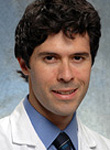| Home News and Events |

|
eCardioVascular BeatSex after heart attack – when is it safe?
James Beckerman, M.D.
Cardiologist, Providence St. Vincent Medical Center Your patient has had a heart attack. Arteries may be opened and medical therapy may be appropriate, but some questions still remain. Could sex trigger another heart attack? Will the patient’s sex life ever be the same? The truth is that sex and heart health are intertwined in a rather, um, intimate way. We already know that sexual health is a barometer for overall health. The ability and desire to have sex point toward a capacity for greater physical activity, healthier relationships and stronger social support. It turns out that our lives inside the bedroom tell us a lot about our lives outside of it. Our sexual fitness can be a symbol of our overall fitness and for our risk for heart disease or even future cardiac events. But there’s more to it than just that. While sex may be a marker of good heart health, it is important to consider that for some people, sexual activity can actually put them at risk. “We should think about sexual activity much the way we think about other types of intense exercise.” Swings in heart rate, blood pressure and stress can increase the possibility of a cardiac event. In most cases, however, the activity itself is less of an issue than the underlying condition. The good news is that less than 1 percent of heart attacks are preceded by sexual activity. But we should think about sexual activity much the way we think about other types of intense exercise. If exercise is appropriate for a patient, then sexual activity usually is appropriate as well. A stress test may be considered before sexual activity is recommended, in much the same way that similar tests are used to guide people starting a substantial exercise regimen after a cardiac event. Some experts suggest waiting two weeks to have sex after having a heart attack, while others recommend waiting at least six weeks before engaging in any vigorous activity. Cardiac rehab builds confidenceDespite the wealth of evidence to support it, cardiac rehabilitation is one of our least-used cardiac therapies. While not as technical as the next-generation stent or as convenient as a daily medication, structured and supervised exercise programs are known to be associated with better cardiovascular outcomes. When heart patients worry about sexual function, a big part of that concern is the fear that physical activity will trigger another event. Cardiac rehabilitation helps patients regain confidence and recognize when physical activity is safe again. Some people certainly should avoid sexual activity, just as they should be careful about exerting themselves in other ways. Symptoms such as chest pain, shortness of breath, dizziness or palpitations should alert them to slow down, and even to take nitroglycerin if symptoms appear compatible with angina. A more careful approach to sexual activity also might be considered for people with cardiac dysrhythmias or for those with defibrillators set to fire at elevated heart rates. We also need to communicate to our patients that medications used for erectile dysfunction should not be mixed with nitrates in any form. Patients are understandably uncomfortable approaching this problem directly. As health care providers we have to read our patients well and take the initiative. When the provider brings up the topic of sex, it shows the patient that the subject is OK to discuss. Often patients are surprised, or even relieved, that the doctor raised the subject because it means they don't have to. The first step involves what is sometimes the most difficult medical intervention of all: a conversation.
Other articles by James Beckerman, M.D. |
|||||||||||||||||
|
|||||||||||||||||
|
Copyright © 2024 Providence Health & Services. All rights reserved. Clinical Trials | Quality and Outcomes | News and Events | About Us | Contact Us | Make a Referral |
|||||||||||||||||